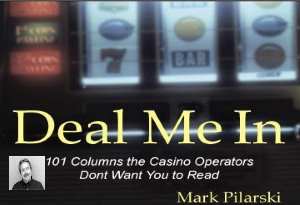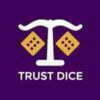My buddy put $20 in a video poker machine, playing $5 a hand to get the maximum payout. He lost the first three hands, but on the fourth was dealt a natural royal flush. Number one, what are the odds of a natural royal flush happening in video poker? Number two, what would happen if he got nervous, and pressed the wrong button discarding all the cards instead of standing? I suspect in that case he is out of luck, and there is no payout. Keith A.
There are a total of 2,598,960 different hands that can be dealt to you in video poker, or 649,760 for each of four suits. Odds for a natural flush on the hand as dealt: one to 649,760. Luckily, the casino allows us mortals to discard some cussed cards before we cross the Rubicon (See below.) By drawing, simultaneously with using your noggin, your chances of hitting a royal flush rise to approximately one in 40,000 — sixteen times better than the odds on a natural.
As to the second part of your question, — nervous buddy, wrong button, etc. – -NOTTA thing would have happened. Why? Because, realizing most players do have nerves on edge passing through what they see as a jungle of hungry lions, slavering tigers, and grizzly bears, all casinos (OK, if not 100% of them, just a twitch fewer.) idiot-proof the machines so as to lock in the jackpot, thus blocking any suicidal tendency among those of us who get nervous among undomesticated beasts.
Besides your common sense answers to gambling questions, I also enjoy at the end of your column the gambling quote of the week. Do you happen to know who is attributed with the quote “the die is cast?” I vaguely remember it being George Washington credited with it when he crossed the Delaware River. Alice P.
Credit instead the owners of Caesar’s Palace in Las Vegas with coming up with the phrase “the die is cast.” Yeah, Alice, I’m exaggerating a bit, but linguistically not far off.
In 49 BC, a different Caesar crossed the Rubicon, a small river forming the boundary between Cisalpine Gaul and Italy. On crossing the river into Italy, he shouted, “iacta alea est,” which means the die is cast.
The significance of Caesar exclaiming “iacta alea est” was that by crossing the Rubicon, he was at the point of no return-he was declaring war on Pompey. Today, when an action marks a situation where there is no going back, we can say the Rubicon has been crossed, or, the die is cast. George was certainly up on his Roman history.
Isn’t there the same amount of ways to roll a seven, as there are six and eight? Am I mistaken? Steve J.
Here’s a secret: the casino isn’t in the business of giving away money. For that reason, the payoff on a six or eight is 7:6 though the true odds are 6.2 to one, giving the casino an advantage over you of 1.52%.
As has been pointed out to me, Steve, dice have six sides, each with a different number of spots from one to six. With two dice, there are 36 possible results when rolling them (six ways one die can fall times six ways the other can fall, 6X6=36). Result: six ways to roll a seven (1+6, 6+1, 2+5, 5+2, 3+4 and 4+3). Considering the 6 or 8, there are only five ways that either can appear: for the six (5+1, 1+5, 4+2, 2+4 and 3+3) and for the eight (6+2, 2+6, 5+3, 3+5, and 4+4). Therefore, you are more likely to roll a seven than a six or eight. Etc., etc. down to 2 — only one way to roll it.
Now for those of you who didn’t know that dice has six sides, honestly, I wouldn’t know where to begin.
Gambling quote of the week: “Don’t gamble. Take all your savings and buy some good stock and hold it till it goes up, then sell it. If it don’t go up, don’t buy it.” Will Rogers




















